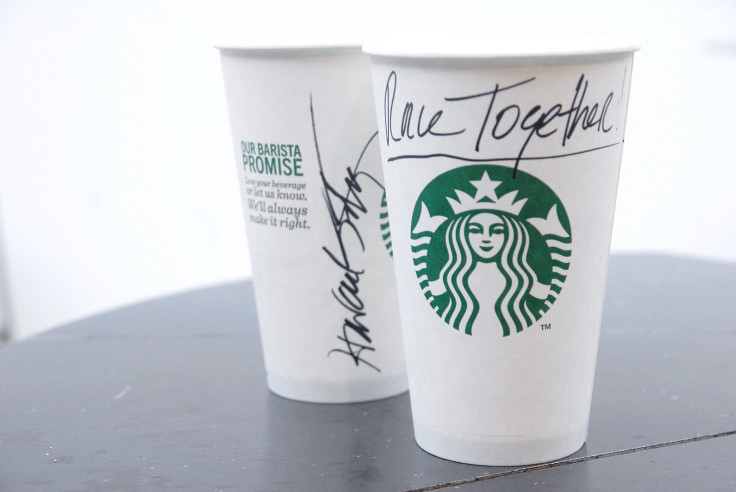Starbucks 'Race Together' Campaign Questioned By Ferguson Area Residents After Michael Brown Shooting

ST. LOUIS -- Marcus Stewart and his family were deeply affected by the events that unfolded here after the death of Michael Brown. The 40-year-old African-American information technology professional took his children, ages 7 and 18, to Ferguson for protests that erupted last year after a grand jury decided not to charge a white police officer, Darren Wilson, in the killing of Brown, an unarmed black teen. The death and the non-indictment created a vast divide in the community long troubled by racial woes, Stewart said. “The lines are drawn here; we’re truly divided,” Stewart said.
That's one of the reasons Stewart said he supports Starbucks' "Race Together" campaign. The initiative, launching Friday, seeks to encourage a coffeehouse dialogue around issues of race. In the Ferguson area, where many are still troubled by what happened last year, such conversations are desperately needed, said Stewart, who visited a Starbucks location in Florissant, Missouri on Thursday. But it likely won't be a light discussion, he warned. “Attempting to make our area come together and agree on this, no, that wouldn’t happen,” said Stewart, who typically works three or four days a week at the Starbucks. “I think a simple understanding and acceptance of both sides is enough.”
Stewart and other customers who were working, studying and lounging at Starbucks locations throughout northern St. Louis County Thursday acknowledged the significance of these potential conversations at Starbucks shops as the coffee chain's "Race Together" campaign begins Friday. The Brown shooting and its aftermath sparked civil unrest locally and protests nationwide that still are fresh in the minds of local residents. Some patrons questioned whether the coffee chain was trying to capitalize on recent events and whether whites and blacks here were ready to broach the volatile topic.
“If you have a white racist and Black Panther engage in this conversation, you put the workers and customers at risk,” said Raynera Hundley, a 46-year-old social worker, who visited a Starbucks Thursday in nearby Hazelwood. “Sometimes coming to Starbucks is a treat. But people are still angry, especially blacks. You don’t want people not to come to Starbucks because they don’t feel comfortable.”
Howard Schultz, the CEO of Starbucks, faced considerable backlash after the initiative was announced earlier this week. Critics were quick to dismiss the idea as naive and questioned whether Starbucks baristas were qualified to initiate meaningful discussions about race. “Race Together is not a solution, but it is an opportunity to begin to re-examine how we can create a more empathetic and inclusive society — one conversation at a time,” Schultz wrote, with initiative partner Larry Kramer, the USA Today publisher, in a Thursday op-ed piece piece for Medium.
Starbucks officials said Thursday the best scenario is one where the conversation does not push customers and employees further onto opposing sides of issues, such as racial inequality and discrimination cited in a Justice Department report of police conduct in Ferguson. A Starbucks in Jennings, along with the Florissant and Hazelwood sites -- all within a few miles of Ferguson -- are expected to participate in "Race Together." Ferguson itself doesn't have a Starbucks.
It’s a voluntary program, so no Starbucks workers are forced to initiate conversations on race, said Linda Mills, a company spokeswoman. Starbucks baristas and employees are encouraged to mark coffee cups with the #RaceTogether hashtag and to distribute a branding sticker to customers. There will be about 100 copies of a conversation guide available at every location nationwide on Friday. The guide, also an insert in Friday’s edition of USA Today, includes a “true or false” questionnaire on topics such as immigration, diversity and family makeup.
Stewart said he “would engage,” but still had reservations. The U.S. Department of Justice’s finding that Darren Wilson did not violate Michael Brown’s civil rights in the fatal encounter last year didn’t alter Stewart’s view that race played a part in Brown’s death. “I wonder who would be the moderator," he said. "Some of the usual customers here will communicate. But some would shy away, especially because of the [Brown] protests.”
A white customer, Timothy Bacon, 21, who was with a friend, Jack Ferrell, 23, at Florissant’s Starbucks Thursday, said he’d never considered coming to a coffeehouse to have discussions about race. “I can’t see having those conversations with people who are not even fully aware of the issues,” said Bacon, a skin care professional. “If anyone were able to do it, I think Starbucks would be able to," said Ferrell, who is also white. "It seems like speed dating, but with race.”
© Copyright IBTimes 2024. All rights reserved.












